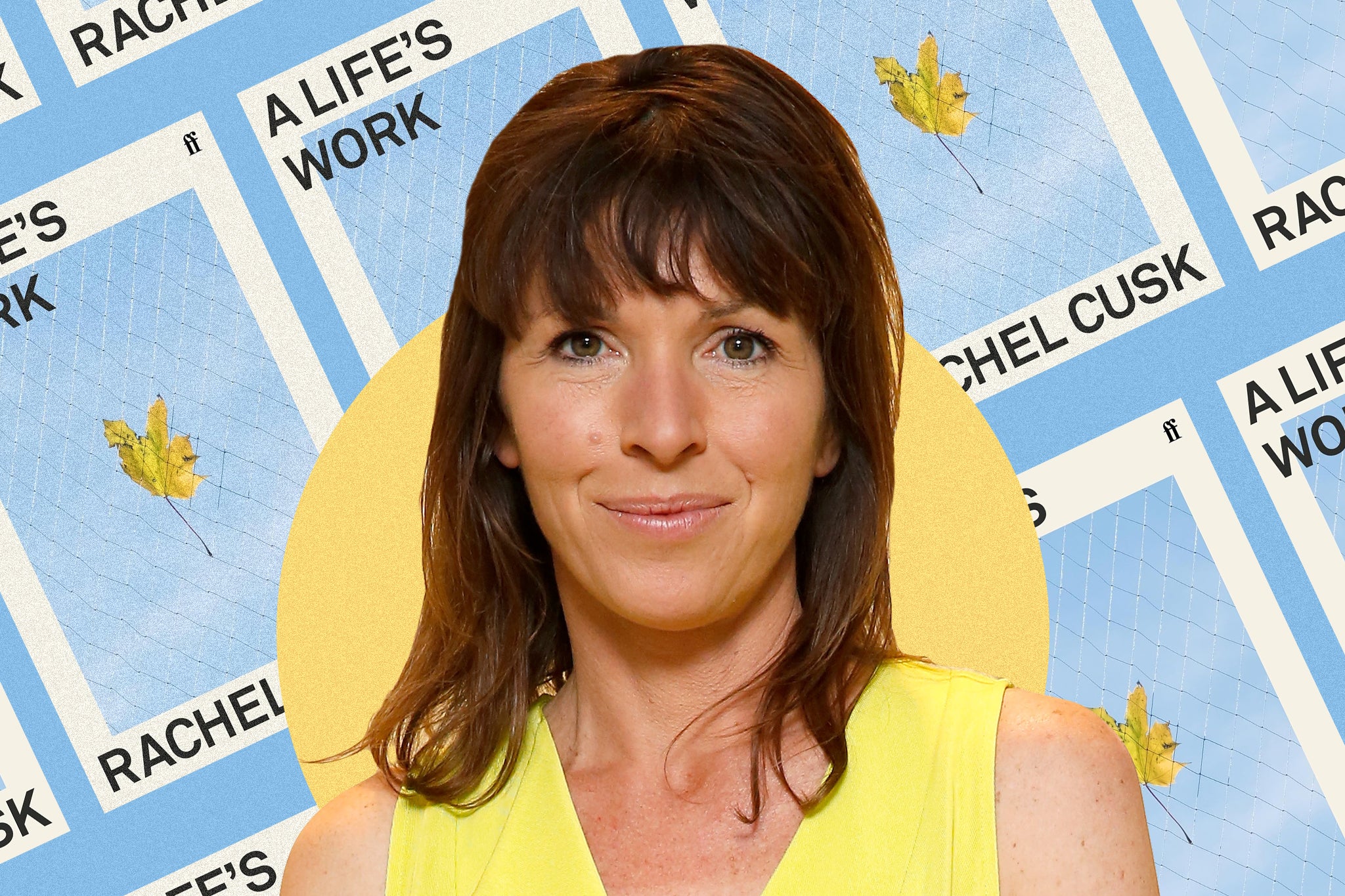How Rachel Cusk’s divisive parenting memoir saved me in early motherhood
Her groundbreaking book ‘Matrescence’, a study of the transition into motherhood, has won Lucy Jones plaudits and an army of dedicated readers. But she could never have written it all without Rachel Cusk’s unflinching 2001 parenting memoir, ‘A Life’s Work’ – a book that was met with frenzied outrage upon publication


I remember the exact moment I read a passage about sleep in A Life’s Work, Rachel Cusk’s beloved and divisive motherhood memoir. I was lying in bed on my side. The baby wasn’t sleeping very much and so I wasn’t sleeping very much, and my mind was starting to unravel. Everyone told me to feed the baby on demand and to never let her cry; no one mentioned the impact sleep deprivation would have on me.
“Sleep, like a great bear, a soft warm vigilant guardian of unconsciousness, had rolled away with a yawn and padded off elsewhere never, it seems, to return,” Cusk wrote. Yes, I thought. Yes. I miss that great bear. That warm, dark nothing. At the time, even when I was asleep, I was alert, matchsticks of hyper-vigilance keeping my eyes open and brain awake. It was such a genius image, like the bear on the final page of Michael Rosen and Helen Oxenbury’s We’re Going on a Bear Hunt, padding off gently down the beach. I could hear the footsteps. I could touch the soft fur through the letters. I remembered the blanket comfort of sleep. The line made me feel normal and human and that my own experience of sleep and sleep deprivation was important when everything around me seemed to be saying the opposite.
I was deeply bewildered by the social institution of motherhood I seemed to have fallen into. The official systems and structures of motherhood – its texts, manuals, posters, authority figures – were bizarrely moralist, controlling, ideological and often unscientific. It was a social institution where deception, misinformation and barely veiled misogyny were rife. Mothers were held to impossible standards, judged, found wanting, and would often feel like failures from the off – however they gave birth, or fed their babies, or raised their babies, or tried to combine work with their babies.
What compounded the surrealness of this new world for me, at the beginning, was a sense of feeling gagged, that saying anything not completely bland about motherhood was forbidden. It was as though the very thoughts of bewilderment, of existential terror, of loss of self, even of obsessive bliss, were wrong. And so then I thought I was wrong. I stayed inside, isolated myself, and was eventually diagnosed with postnatal depression (the full story is in my book Matrescence). I know now that this isn’t an unusual experience. Studies suggest that a relational element of postnatal distress is a sense of failure and shame that prevents women from connecting to others. Since publishing Matrescence, in which I explore the biological, psychological, emotional and social transition to motherhood, I have been stunned by the messages I receive daily from readers of how common – and corrosive – the sense of silencing, shame and stigma around the maternal experience is today.
A few things helped me. Discovering the word and concept of matrescence, and realising that becoming a mother is a significant development stage. Meds. The woods. Cold river swims. Writing. And: books. Well, specifically, writing by women trying to make sense of what being a mother is. And in particular, A Life’s Work.

The contrast between Cusk’s expression of her experience – visceral, physical, ambivalent, emotional – and the neutered, inhuman tone of the childcare manuals was thrilling and quenching in those early months. “The childcare manual is the emblem of the new mother’s psychic loneliness,” she writes in the Introduction. And, for me, A Life’s Work became the opposite: the beginning of my being able to step out of loneliness and isolation and shame, speak to other mothers, and realise most were feeling similarly blindsided. I’m sure many thousands of readers have felt the same.
What I loved about A Life’s Work – and it’s there in all her books that have followed, including the recently published Parade – was the space she gives to the existential experience of birth and motherhood. She considers maternal subjectivity, the selfhood of a woman who is a mother, and the socio-political experience of motherhood, each to be important topics of attention and for literature. This is no small thing. It probably involved slaying the “angel in the house”, to use Virginia Woolf’s term.
This is how Woolf described the angel of the house in a lecture in 1931:
“She was intensely sympathetic. She was immensely charming. She was utterly unselfish. She excelled in the difficult arts of family life. She sacrificed herself daily. If there was chicken, she took the leg; if there was a drought she sat in it – in short she was so constituted that she never had a mind or a wish of her own, but preferred to sympathise always with the minds and wishes of others.”
She wasn’t expressing her subjective truth about womanhood and motherhood in patriarchal late-stage capitalism, in other words.
Of course there is something beautiful – not to mention essential – in sacrifice, and in care work, and looking after other people. We should value it properly in our society as one of the highest arts and actions, but the fact is, in today’s institutions of care, individual women are most often expected to sacrifice themselves completely for others, and this is unfair and damaging for wider society.
Every time I sat down to write Matrescence, I felt that I had to do battle with the angel in the house, but thanks to Woolf and Cusk and many others, I knew what she looked like. “It is far harder to kill a phantom than a reality,” wrote Woolf. And this is what Cusk does: she illuminates the conditions and the ideals that exist to trap and silence women; ideals which mean pregnancy, birth and the many thousand ways of being a mother and not a mother are still underwritten and unrecorded.
“Birth is not merely that which divides women from men: it also divides women from themselves, so that a woman’s understanding of what it is to exist is profoundly changed,” she wrote, with uncanny premonition, decades before the new science of the maternal brain would show how pregnancy alters the neural basis of the self.
“When she is with them she is not herself; when she is without them she is not herself; and so it is difficult to leave your children as it is to stay with them. To discover this is to feel that your life has become irretrievably mired in conflict, or caught in some mythic care in which you will perpetually, vainly struggle.”
These clear words were a balm to me. I had thought – and I know from letters I’ve been sent by readers of Matrescence – that this is again not uncommon today, that any emotional struggles I had with becoming a mother meant there was something wrong with me because motherhood was depicted as so pastel-hued and Madonna-like and pacific.
In Cusk’s new novel ‘Parade’, she continues to X-ray the conditions of contemporary womanhood and motherhood. The novel is thoughtful and true, with velvet prose, succulent and graceful
But Cusk gave me permission to feel what I did, which was that the experience was multifaceted. Joyful and ecstatic and full of beauty and gladness and contentment but also, necessarily (and unnecessarily, because of patriarchal capitalism), an insurrection of identity, a marooning of the self and a new life of pain and fear. As she puts it, “The painful stump of our jointness, livid and fresh.”
For taking on the angel in the house, and expressing her experiences in A Life’s Work, Cusk attracted frenzied outrage and unprocessed opprobrium. She was accused of “child-hating, of postnatal depression, of shameless greed, of irresponsibility, of pretentiousness, of selfishness”. She was condemned by reviewers for being a “bad mother”. (Reading the book again, I’m surprised Cusk was accused of “not loving her children”; it pulses with love for her baby.)
In Cusk’s new novel Parade, she continues to X-ray the conditions of contemporary womanhood and motherhood. The novel is thoughtful and true, with velvet prose, succulent and graceful. The subject matters are richly layered – shame, interpretation, transference, the unknowability of the body, the vulnerability and wounds of self, the possibilities of art.
Again, she doesn’t flinch at describing the roles and conventions patriarchal society demands women and mothers twist and deform themselves into. Indeed, sentence after sentence is a bullseye.

On the suppression and denial of the female and maternal experience, she writes: “I found that I could associate this death-in-life with other events and experiences, most of which were consequences in one way or another of my biological femininity.”
On the bizarre disavowal of reproductive labour and the raising of children: “Those female experiences, I now saw, had usually been attributed to an alternate or double self whose role it was to absorb and confine them so that they played no part in the ongoing story of life.”
On having children: “....the impulse to have a child is very often a response to the woman’s own childhood, as though her childhood has left her incomplete, or has taken a part of her that she is driving to find again”.
I don’t think I could’ve written Matrescence without Cusk’s work. Reading A Life’s Work gave me the strength to write. A character in Parade describes art as “the pact of individuals denying society the last word”. I am grateful that Cusk continues to uphold this pact, to tell the truth, to write it as it is. She is a disciple of the truth, and she helps us to see.
Rachel Cusk’s latest novel, ‘Parade’, is out now, published by Faber. The paperback of ‘Matrescence’ by Lucy Jones is also out now, published by Penguin
Join our commenting forum
Join thought-provoking conversations, follow other Independent readers and see their replies
Comments
Bookmark popover
Removed from bookmarks